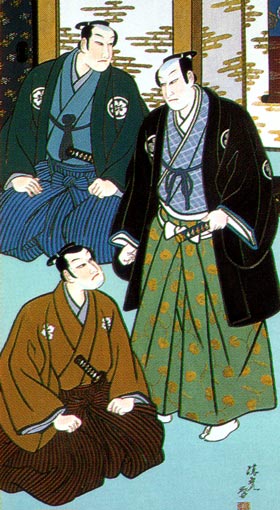| SHďGUN EDO O SARU |
| Play titles | Sh˘gun Edo o Saru Edo-j˘ S˘zeme The Sh˘gun Leaves Edo |
| Author | Mayama Seika |
| History |
Premiere January 1934 at the T˘ky˘ Gekij˘ of the third (and final) part of "Edo-j˘ S˘zeme", which was entitled "Sh˘gun Edo o Saru" ('The Sh˘gun Leaves Edo') [casting]. |
| Structure |
"Sh˘gun Edo o Saru" was made up of one act (three scenes). |
| Key words |
Amano Hachir˘ Bakumatsu Bakumatsumono Boshin Sens˘ Edo-j˘ Kan'eiji Meiji Ishin Miokuri Rekishigeki Senju Shinkabuki Sh˘gitai Takahashi Deishű Takahashi Hirotake Takahashi Ise-no-Kami Tokugawa Yoshinobu Ueno Ueno Sens˘ Yamaoka Tesshű Yamaoka Tetsutar˘ |
| Summary |
Act I, scene 1: Ueno Sh˘gitai A treaty has been meticulously negotiated between the Shogunate and the loyalist troops, outlining a peaceful evacuation plan for Edo Castle and the restoration of ruling authority to the Imperial house, all contingent upon specific conditions. However, an unforeseen twist arises as the brash behavior of the loyalist Satsuma clan members deeply agitates Sh˘gun Tokugawa Yoshinobu. In a surprising turn of events, he hesitates at the eleventh hour, choosing to delay his departure from the castle. Supporting his decision are the fervent and zealous young members within his own army, who fervently yearn to safeguard the castle through potential conflict against the Imperialists. Guided by his conviction, Amano Hachir˘ leads the Sh˘gitai, a resolute pro-shogunate force stationed at the Kan'eiji Temple in Ueno, where Yoshinobu currently resides while awaiting unfolding developments. Yamaoka Tetsutar˘, a loyal and dedicated retainer of the Shogunate, rushes to the scene upon learning of Yoshinobu's abrupt change of heart. His urgent mission is to implore Yoshinobu against impulsive actions that might plunge the city of Edo into a violent battlefield, thereby endangering the lives of its citizens. Yamaoka, possessing both astute statesmanship and unwavering loyalty, has played a significant role in engaging with loyalist leaders and negotiating terms that would enable Yoshinobu to gracefully relinquish his Sh˘gun title. This concession, granted after pledging allegiance to the Emperor and vacating Edo Castle, is now at risk of being swept aside by imminent turmoil. Yamaoka is deeply troubled by the looming threat, which could undo all his painstaking efforts to secure a peaceful resolution. Amano Hachir˘'s men resort to force in their attempts to detain Yamaoka, fully aware of his purpose in seeking an audience with Yoshinobu. Amano himself emerges from the situation, taking charge of his men and reigning in their aggression. However, being privy to Yamaoka's mission, Amano remains hesitant to grant him passage. A heated disagreement unfolds, only ceasing when influential Takahashi Hirotake, Yamaoka's brother-in-law, intervenes, ultimately facilitating Yamaoka's admittance through the monastery gates. Act I, scene 2: Ueno Daijiin The Daijiin is a small monastery located within the precincts of the Kan'eiji Temple in Ueno. Tokugawa Yoshinobu, slated to depart the monastery for his estate in the Mito province the next day as per the provisional treaty, sits within his chamber, cloaked in a melancholic mood. Pressured by certain followers and his own dissatisfaction with the stance of the Satsuma leaders, he has chosen to delay his departure, a decision echoing his reluctance to grant Yamaoka an audience due to Yamaoka's well-known standpoint. Consequently, Yamaoka finds himself confined to an adjacent room, while Takahashi Hirotake undertakes discussions with Yoshinobu in an attempt to address the situation. Amidst the ongoing discourse, marked by its somewhat stilted progression, Yamaoka's voice seeps audibly from the neighboring chamber. His daring and deliberately insolent criticisms pierce through, taking aim at the Sh˘gun's disposition. Initially feigning indifference, Yoshinobu eventually succumbs to his rising ire, beckoning Yamaoka into his presence. Seizing the opportunity he has been awaiting, Yamaoka encourages Yoshinobu to pledge allegiance to the Emperor and effect a peaceful withdrawal to Mito. Over time, the fervor of Yoshinobu's anger recedes, leaving behind a pensive and crestfallen countenance. Observing the pathos imbued in the situation, Yamaoka is moved to tears by Yoshinobu's inner turmoil and distress. Act I, scene 3: Senju no ďhashi The Tokugawa family has held sway from Edo Castle for a span of almost three centuries. A profound bond exists between the people of Edo and the Tokugawa lineage, with Yoshinobu poised to serve as the final Sh˘gun. Word of Yoshinobu's impending departure from Edo at daybreak prompts a gathering of tearful citizens, all present to bid a poignant farewell to their departing leader (miokuri). A poignant scene unfolds near the ďhashi Bridge in Senju, a significant landmark demarcating the boundaries of Edo. In due time, Yoshinobu arrives, attired in simple garments and accompanied solely by a modest entourage. As he approaches the bridge, Yamaoka rushes forward, his tears flowing freely, proclaiming that Yoshinobu's footfall on the bridge signifies his permanent departure from the soil of Edo. Yoshinobu engages in a poignant interlude, a moment of reflection upon the centuries-long dominion of the Tokugawa dynasty and his own profound affection for Edo and its inhabitants. Then, with a final, anguished farewell, Yoshinobu steps onto the bridge, exiting Edo's realm, thereby drawing the curtains on a pivotal era within Japan's storied history. |
 |
|
"Sh˘gun Edo o Saru" |
|
|
| Contact | Main | Top | Updates | Actors | Plays | Playwrights | Programs | Links | FAQ | Glossary | Chronology | Illustrations | Prints | Characters | Derivatives | Theaters | Coming soon | News |